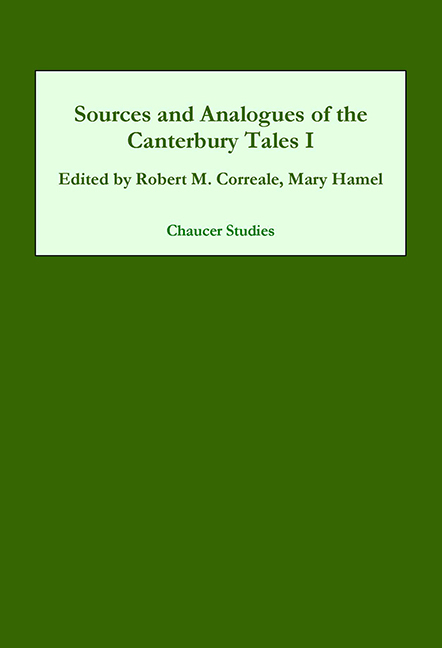Book contents
- Frontmatter
- Contents
- preface
- Acknowledgements
- The Frame
- The Reeve's Tale
- The Cook's Tale
- The Friar's Tale
- The Clerk's Tale
- The Squire's Tale
- The Franklin's Tale
- The Pardoner's Prologue and Tale
- The Tale of Melibee
- The Monk's Tale
- The Nun's Priest's Tale
- The Second Nun's Prologue and Tale
- The Parson's Tale
- Contributors and editors
- General Index
- Index of Manuscripts
The Cook's Tale
Published online by Cambridge University Press: 25 October 2017
- Frontmatter
- Contents
- preface
- Acknowledgements
- The Frame
- The Reeve's Tale
- The Cook's Tale
- The Friar's Tale
- The Clerk's Tale
- The Squire's Tale
- The Franklin's Tale
- The Pardoner's Prologue and Tale
- The Tale of Melibee
- The Monk's Tale
- The Nun's Priest's Tale
- The Second Nun's Prologue and Tale
- The Parson's Tale
- Contributors and editors
- General Index
- Index of Manuscripts
Summary
When the Cook intervenes in the storytelling contest of the Canterbury Tales he emerges in considerable detail. What is said about him and what he says about himself are consistent with the description of him in the General Prologue, but enrich and develop it. In the General Prologue he is associated with London (I[A], 382), which he twice refers to later as “oure citee” (4343, 4365). It also emerges that he has a shop in London (4352), and that his name is Roger of Ware (4336, 4353). It may be that he is based on a certain Roger Knight of Ware, Cook, who appears to be the man accused of being a “common nightwalker,” that is, one who broke the curfew, in 1373 and who is named in pleas of debt in 1377 and 1384. If it were the case that Chaucer's model for this character was called “Knight” it would make sense of what appear to be two jokes about the Cook: he is once called by Harry Bailly “gentil Roger” (4353), and in the Manciple's Prologue when he falls off his horse in a drunken stupor he is referred to ironically as “a fair chyvachee of a cook” (IX[H], 50) – both of which connote a nobility which he fails to live up to. It is probably no accident that he is involved in two altercations with Harry Bailly, the innkeeper from Southwark, again a character based on a real person from the metropolis: enmity between cooks and innkeepers was traditional. It looks as though Chaucer had a fairly secure sense of how he saw the Cook, possibly because the Cook was based on somebody known to him. And when he begins the Cook's Tale there is the same precise concentration on local detail. It is set in London, and Cheapside, one of its principal thoroughfares, and Newgate, one of its main prisons, are both mentioned (4377, 4402). The story also involves an apprentice in one of the London victuallers trades (4365–6).
- Type
- Chapter
- Information
- Sources and Analogues of the Canterbury Tales: vol. I , pp. 75 - 86Publisher: Boydell & BrewerPrint publication year: 2002

